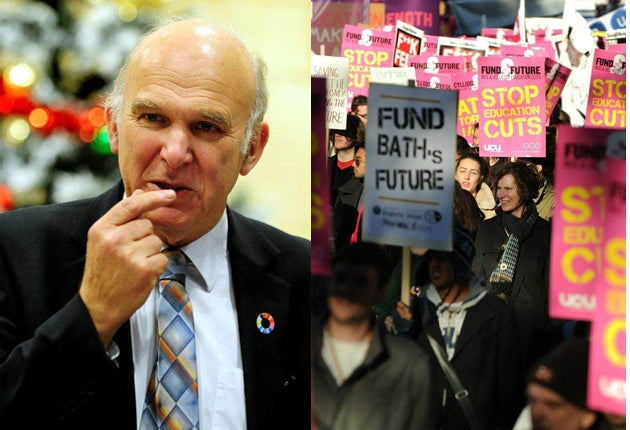Government accused of 'sleight of hand' over tuition fees

Your support helps us to tell the story
From reproductive rights to climate change to Big Tech, The Independent is on the ground when the story is developing. Whether it's investigating the financials of Elon Musk's pro-Trump PAC or producing our latest documentary, 'The A Word', which shines a light on the American women fighting for reproductive rights, we know how important it is to parse out the facts from the messaging.
At such a critical moment in US history, we need reporters on the ground. Your donation allows us to keep sending journalists to speak to both sides of the story.
The Independent is trusted by Americans across the entire political spectrum. And unlike many other quality news outlets, we choose not to lock Americans out of our reporting and analysis with paywalls. We believe quality journalism should be available to everyone, paid for by those who can afford it.
Your support makes all the difference.Thousands of the poorest graduates will be worse off under the Government's higher education reforms because of a statistical "sleight of hand" by ministers, The Independent has learnt.
The change means that graduates earning just £18,000 a year in today's money will have to start paying hundreds of pounds a year to the Treasury when they leave university in 2016.
When the Government announced the scheme earlier this month, Vince Cable, the Business Secretary, suggested that repayments would not start unless a graduate was earning at least £21,000 a year.
Last night the respected economic think-tank the Institute of Fiscal Studies (IFS) withdrew its assertion that up to 30 per cent would be better off following a clarification of the figures by the Department of Business. It is now thought that only 20 per cent of future graduates will benefit from the plans, with eight out of 10 graduates paying more than at present.
Last night the National Union of Students (NUS) accused ministers of issuing misleading information and called on them to "urgently clarify" the situation. John Denham, Labour's shadow Business Secretary, described the revelation as "astonishing".
Under proposals originally put forward by Lord Browne in his review of higher education funding last month, students going to university in 2012 would pay up to £9,000 a year in fees to cover the cost of their course. They would start repaying the money the year after they graduated – but only if they earned over £21,000 a year.
In his report, Lord Browne wrote: "As the repayment threshold (on student fees) has not been increased since 2005 there will be a one-off increase at the start of our new system from £15,000 to £21,000." He added: "The threshold will then... increase in line with average earnings."
But between the report being published and the ministerial announcement on the changes, it was decided this "new system" would start in 2016 when the students leave university and not in 2012 when they start. The small change means that the £21,000 will only be worth around £18,500 in today's money due to inflation, saving the Treasury millions of pounds.
They will also now only be reviewing "average earnings" every five years – resulting in a significant lag between inflation and repayments. Last night, Mr Denham said: "We had all assumed the costings were in today's money and that the £21,000 repayment threshold would rise by average earnings. That now looks like a sleight of hand."
Aaron Porter, head of the NUS, called on ministers to rethink the policy. "Plans to rush through a tripling of tuition fees are based on a dodgy dossier," he said. "It is not clear why the Government allowed the IFS and the public to believe it was basing repayments thresholds on 2012 prices rather than 2016 prices. Certainly, these revelations suggest that students would be forced to pay considerably more than it first appeared, and raise many questions as to the supposed and much vaunted 'progressive' deal students would receive under the new plans."
Last night the Government claimed it had always intended to start the repayments at £21,000 in 2016. But in the House of Commons at the time, Vince Cable quoted the IFS figures even though his officials should have realised they were faulty.
He said: "My statement was originally going to say that 20 per cent of graduates would pay less than they do at the moment, but I was fortified by discovering from the IFS's commentary that the percentage is actually 30 per cent. Almost one in three graduates will pay less than they do at the moment under the scheme that the Labour Government introduced."
In a statement, the IFS said it would be releasing fresh figures next week. "The analysis published by the IFS last Thursday attempted to provide the first comprehensive quantitative assessment of the Government's proposals announced on 3 November," the IFS said.
The statement added: "After this was published, we learned that our modelling was based on an incorrect understanding of the Government's proposals. We will be publishing a revised analysis next week."
Join our commenting forum
Join thought-provoking conversations, follow other Independent readers and see their replies
Comments